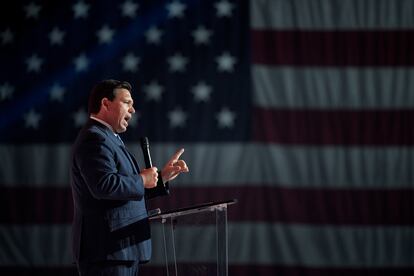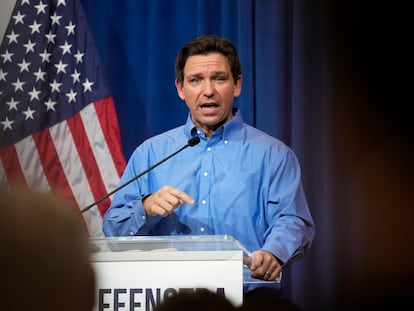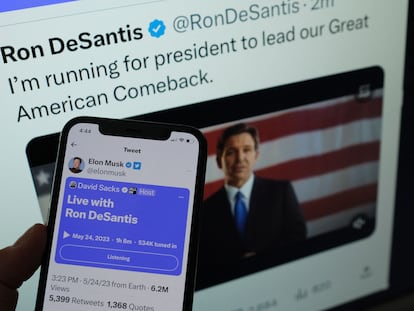DeSantis vs. Trump, the great battle of the Republican Party
The Florida governor’s showdown with the former president will define the presidential primaries and the future of the political group. While the real estate magnate is leading in the polls, he knows that trends can quickly change

In his botched launch to announce his presidential campaign on Twitter, Ron DeSantis only said the word “trump” once. And he was not talking about former president, but rather using the word as a verb. “Merit must trump identity politics,” he said in his speech on Wedneday. Although DeSantis did not mention Donald Trump once, the former president is the Florida governor’s biggest rival in the Republican Party’s presidential primaries.
Trump, on the other hand, mentioned DeSantis many times — if not exactly by his name. Following DeSantis’ announcement on Wednesday, the former president called him “Ron DeSanctus” and “Ron DeSanctimonious”; “Ron DiSaster” in reference to the glitches of his Twitter launch; and “Rob” after a British newspaper got the governor’s name wrong — a jibe intented to suggest that he was so insignificant that people don’t even know his name. “The way he handled his announcement, he will handle the country!” Trump posted on his social netwok Truth Social.
Trump, 76, loves to call his rivals names like a schoolyard bully. But his fierce response to the Florida governor shows that he fears his Republican rival. The real estate magnate may leading in the polls, but he knows very well how quickly ratings can change, especially given the legal proceedings he is still set to face.
That’s what DeSantis is counting on. “I think a lot of what [Trump’s] doing is showing everybody that he understands that I’ve got a good chance to beat him because he doesn’t criticize anybody else,” DeSantis told Jack Heath on the Good Morning New Hampshire radio show on Thursday. “They wouldn’t do that if they didn’t think that I had a chance, because I think they realize I am offering folks a record of achievement that’s second to none. They know that I’m more likely to win the election.”
DeSantis, 44, has to maintain a delicate balance. To win the primaries, he will need more than just the votes of Trump critics, he will also need to convince some of Trump’s supporters that he has a better chance of beating Joe Biden, who has no strong rivals in the Democratic primaries. But he needs to pick his battles carefully. Arguments that have been effective for Biden, such as accusing Trump of threatening democracy, would backfire on DeSantis.
But the governor of Florida has found some points that he believes will help sway the rank and file of the party. DeSantis, for example, criticizes the fact that Trump appointed Jerome Powell as president of the Federal Reserve — a post later renewed by Biden. In this way, he can blame both Trump and Biden for the high rates of inflation in the United States. He has also argues that debt and the deficit increased under Trump, another key issue for his voters. And regarding the border police, DeSantis has promised to “get serious and finally build a wall along the southern border” — a task he says that Trump failed to complete.
As the governor of Florida, DeSantis approved a ban on abortion after six weeks of pregnancy, a move he also believes will sway over voters in the Republican primaries. While Trump boasts of having appointed the Supreme Court justices who revoked the federal right to abortion, he does not support a federal ban on banning abortion throughout the country.
But DeSantis’ favorite topic is the Covid-19 pandemic. Florida reopened businesses earlier than other states, which was good for the economy, and slowed down the Covid-19 vaccination drive, which was very bad for public health. DeSantis has built a public narrative based on his management of the pandemic, and it’s one that connects with anti-vaccine voters of the Republican Party. When Donald Trump Jr. tweeted a meme of his father tackling DeSantis, the governor’s aide Christina Pushaw, shot back: “Your dad could not even tackle the 110 lb. Keebler Elf known as Anthony Fauci,” in reference to the prestigious epidemiologist who coordinated the pandemic response and became the object of the wrath of the Republican Party. Despite this, Trump kept him in office.
DeSantis has been also mixing his criticism of Trump with praise. In an interview Thursday night on Newsmax television, where he suffered yet another technocal issue, he said: “I think at the end of the day most of our voters appreciate a lot of the things that President Trump did. I do. He’s been attacking me a lot, but I still give him credit for the things that he did well, especially with the economy in the first three years.” But then, in a separte interview on Matt Murphy’s radio show on station 99.7 WTN, he criticized Trump. “He’s obviously attacking me from the left,” he said. “I don’t know what happened to Donald Trump. He’s a different guy today than when he was running in 2015 and 2016 and I think the direction that he’s going with his campaign is the wrong direction.”
DeSantis’s ideology is conservative, populist, protectionist and defiant: a kind of Trumpism without Trump. He is more aggressive about cuts in social security and health, and has taken more extreme steps in the culture wars against diversity and gender identity. He has banned Chinese citizens from buying property in Florida, and called the Ukraine war a “territorial dispute,” athough he later claimed he had been misunderstood.
DeSantis has a seemingly perfect résumé (baseball captain, middle-class family, Yale and Harvard graduate, Navy veteran, congressional and gubernatorial experience, young, married with three young children), but the governor lacks charisma and people skills. The Trump campaign said a Twitter presidential launch was ideal for DeSantis because it meant he didn’t have to see anyone.
In reality, DeSantis is not waging an ideological battle against Trump (the two do not have many differences) nor is he in a popularity contest (where he would clearly lose to Trump). What he is aiming to do is convince the most staunch Republicans that he is the better candidate to defeat Biden. His victory in Florida with a 19-point lead came in stark contrast to the defeat of numerous Trump-backed candidates in the midterm elections last November.
Many blamed the former president for the fact that the much-hyped red tide that was set to sweep the House and the Senate did not eventuate. That was the moment when many looked at DeSantis as a possible candidate for the 2024 presidential election, starting with his own followers, who at the midterm celebrations chanted: “Two more years!” even though the governor’s term is four.

In his presidential launch via Twitter Space, DeSantis summed up this approach: “There is no substitute for victory. We must end the culture of losing that has infected the Republican Party in recent years. The tired dogmas of the pastor are inadequate for a vibrant future. We must look forward, not backwards. We need the courage to lead, and we must have the strength to win.” But during the Republican primariers, it may be difficult to convince voters to make that calculation. When it comes down to it, the primaries are, after all, a popularity contest.
While DeSantis measures his criticism of Trump, the former president is not holding back. “I think he is very disloyal, but he’s got no personality. If you don’t have a personality in politics, it’s a very hard business,” he said last week. “He desperately needs a personality transplant and, to the best of my knowledge, they are not medically available yet. A disloyal person!” he added in a post on Truth Social.
DeSantis and Trump had a good relationship, but the former president feels betrayed as he believes the governor owes his victory in Florida to him. “He was dead. He was looking for jobs, and I endorsed him, and he went up many points. He was 30 points down, at least, maybe more than that. He was dead. So I think he’s very disloyal but I don’t care. Look a poll just came out in Iowa. I’m leading by 30 or 40 points. I don’t mind at all,” he said while playing golf outside Washington last week.
And it’s true the polls give Trump a wide advantage: 53.9% to 20.4%, according to the average of the FiveThirtyEight polls, a distance that until now has been widening. It is not often that a candidate with a clear lead ends up losing. The last time this happened was when Barack Obama defeated Hillary Clinton in the Democratic primaries. Trump himself began at the bottom in 2016, but that year, there were 17 presidential candidates, and no one had a major advantage. Trump also has more support among the party’s lawmakers, including those from Florida, which the former president often boasts of as a great triumph.
Defeating Trump in the Republican primaries is going to be particularly difficult for DeSantis as the primary system favors the winner of each state (who in many cases takes all the delegates). What’s more, Trump opponents have several options to choose from, which could take away voters from the governor. So far, the race for the Republican nomination includes Tim Scott, the only Black Republican senator; Nikki Haley, former U.S. Ambassador to the United Nations and former South Carolina Governor; Arkansas Governor Asa Hutchison; billionaire biotech entrepreneur and enemy of woke ideology Vivek Ramaswamy; fellow businessman Perry Johnson; political commentator Larry Elder; and politician and businessman Rollan Roberts, son of the West Virginia senator of the same name. Trump’s former vice president, Mike Pence, is also expected to run for the Republican nomination, and there is speculation that Virginia Gov. Glenn Youngkin will also announce a White House run.
To participate in the primary debates, candidates will have to exceed a certain threshold of support. But Trump has hinted that he will not participate in the debates. “When you’re leading by seemingly insurmountable numbers, and you have hostile Networks with angry, TRUMP & MAGA hating anchors asking the ‘questions,’ why subject yourself to being libeled and abused?” he wrote on his social media platform last week. The governor, on the other hand, has taken the opposite view. “I think we should debate. I think the people want to hear it,” he told Fox News on Wednesday. “I think all of us have to go out and earn it. That’s exactly what I intend to do. And I think the debates are a big part of the process.”
Trump’s pending legal cases
Normally, the number of candidates typically thins out as contenders drop out of the race when they see they have no chance of winning. With events in 12 cities between Tuesday and Friday, DeSantis will launch his candidacy next week in Iowa, New Hampshire and South Carolina, the first states to vote in the primaries. The calendar — which is yet to be finalized — indicates that March will be the decisive month, starting with the so-called Super Tuesday on March 5. By March 25 — the date when Trump is set to stand trial in New York over 34 counts of falsifying business records in connection to hush money paid during the 2016 presidenital campaign — almost 75% of the delegates will have been elected.
Trump is facing other legal cases, but not even a civil conviction for sexual abusing a New York writer has affected his popularity. He is presenting himself as a vigilante and is promising to exact revenge if elected president. DeSantis said he is willing to pardon Trump if he were connected along with the protesters who stormed the U.S. Capitol on January 6, 2021: “On Day One, I will have folks that will get together and look at all these cases, who are people who are victims of weaponization or political targeting, and we will be aggressive at issuing pardons,” he said last week in an interview in The Clay Travis & Buck Sexton Show.
Both Trump and DeSantis (who raised $8.2 million on his first day of campaigning) have the funds to maintain a high-profile publicity battle. Florida’s governor has attracted some big donors, but the former president has not shortage of donors, and receives more donations from the rank and file — giving the impression that he is the people’s candidate while he golfs at an elite private club.
Sign up for our weekly newsletter to get more English-language news coverage from EL PAÍS USA Edition
Tu suscripción se está usando en otro dispositivo
¿Quieres añadir otro usuario a tu suscripción?
Si continúas leyendo en este dispositivo, no se podrá leer en el otro.
FlechaTu suscripción se está usando en otro dispositivo y solo puedes acceder a EL PAÍS desde un dispositivo a la vez.
Si quieres compartir tu cuenta, cambia tu suscripción a la modalidad Premium, así podrás añadir otro usuario. Cada uno accederá con su propia cuenta de email, lo que os permitirá personalizar vuestra experiencia en EL PAÍS.
¿Tienes una suscripción de empresa? Accede aquí para contratar más cuentas.
En el caso de no saber quién está usando tu cuenta, te recomendamos cambiar tu contraseña aquí.
Si decides continuar compartiendo tu cuenta, este mensaje se mostrará en tu dispositivo y en el de la otra persona que está usando tu cuenta de forma indefinida, afectando a tu experiencia de lectura. Puedes consultar aquí los términos y condiciones de la suscripción digital.
More information
Archived In
Últimas noticias
Maduro pleads not guilty before the federal court in New York: ‘I am still the president of Venezuela’
A new test can detect Alzheimer’s from a finger prick
UN team enters Sudanese city of El Fasher after paramilitary massacre: ‘It’s like a ghost town’
A recipe for resistance: Indigenous peoples politicize their struggles from the kitchen
Most viewed
- Gilles Lipovetsky: ‘If you want to live better and fall in love, take Prozac, don’t look to philosophy’
- Alain Aspect, Nobel laureate in physics: ‘Einstein was so smart that he would have had to recognize quantum entanglement’
- Alvin Hellerstein, a 92-year-old judge appointed by Bill Clinton, to preside over Maduro’s trial in New York
- Why oil has been at the center of Venezuela-US conflicts for decades
- Maduro’s downfall puts China’s relationship with Venezuela to the test











































